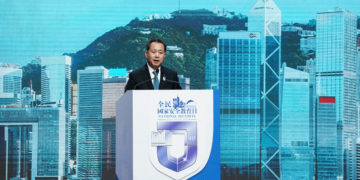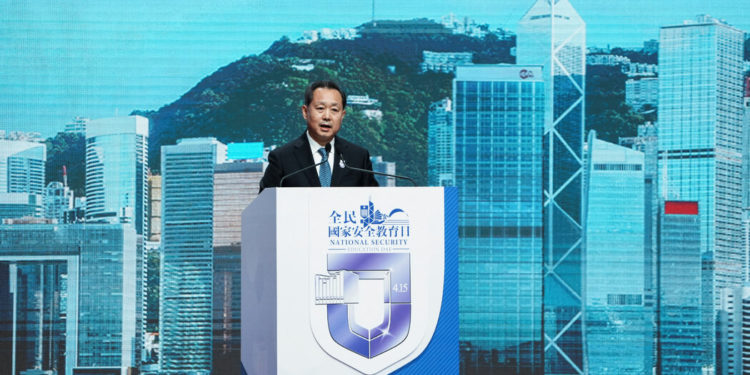The U.S. fired a new round of sanctions at China on Monday, targeting six high-level Chinese and Hong Kong officials over what it described as acts of transnational repression for their crackdown on pro-democracy activists in Hong Kong and on U.S. soil.
The move was the first significant step by the new Trump administration to pressure China over human rights in Hong Kong. The State Department said in a statement that the officials used the city’s national security laws “to intimidate, silence, and harass 19 pro-democracy activists who had been forced to flee overseas, including a U.S. citizen and four other U.S. residents.”
The sanctioned officials included Dong Jingwei, China’s top national security official in the city since 2023. In his previous role as China’s vice minister of state security, Mr. Dong led the country’s efforts to track dissidents and catch foreign spies.
Hong Kong’s Secretary for Justice Paul Lam and Police Commissioner Raymond Siu were also among the six officials within national security bodies and the police force who were sanctioned for their roles in “coercing, arresting, detaining, or imprisoning” individuals under the national security law.
In a national security crackdown since widespread unrest rocked the city in 2019, the Hong Kong authorities have jailed scores of opposition lawmakers, activists and others, including journalists, in the city.
The state department also Monday released an annual report saying that the Hong Kong government had continued to use its broad national security laws to undermine human rights and civil liberties in Hong Kong, a criticism other Western countries have also made. It noted that, as recently as December, the Hong Kong government had offered bounties for information leading to the arrests of dissidents living overseas.
Hong Kong activists in the United States welcomed the move.
“Many of us have endured relentless pressure and threats through transnational repression. It truly means a great deal to see the U.S. taking the lead in holding accountable the officials who orchestrated these actions,” Frances Hui, who was granted political asylum in the U.S., said in a statement on behalf of the Committee for Freedom in Hong Kong Foundation in Washington. Family members of overseas activists including Ms. Hui have been questioned in Hong Kong by its national security police.
The Chinese embassy in Washington said in a statement that its enforcement of these laws, which were first imposed in 2020 in the aftermath of months of monthslong mass pro-democracy protests the year before, were “just and necessary” to return stability and prosperity to the Chinese territory. It also condemned the sanctions, calling it a “gross interference in China’s internal affairs and Hong Kong affairs.”
The Hong Kong government described the sanctions as “despicable behavior” and acts of intimidation that “clearly exposed the U.S.’s barbarity.”
The state department’s sanctions place restrictions on property ownership and financial dealings of the individuals in the United States. The U.S. has already sanctioned dozens of other Chinese and Hong Kong senior officials, issuing travel bans and directives to freeze assets imposed in 2020 and 2021.
Secretary of State Marco Rubio, long an outspoken critic of China’s human rights record, said that Monday’s actions demonstrated the Trump administration’s commitment to hold to account those responsible for restricting freedoms of people in Hong Kong and pursuing those based overseas.
Willy Wo-Lap Lam, a senior Fellow at The Jamestown Foundation in Washington, noted that while the sanctions were consistent with Mr. Rubio’s stance toward China, President Trump himself has not publicly placed much emphasis on supporting human rights in the region. The Trump administration has drastically cut funds to organizations that have long given a voice to dissident communities in China and other countries, including Voice of America and Radio Free Asia.
“Trump himself doesn’t have that much of an interest in what’s happening in Tibet, in Xinjiang and in Hong Kong,” Mr. Lam said. “But it’s just another card to play in the longstanding systemic competition with China.”
Tiffany May is a reporter based in Hong Kong, covering the politics, business and culture of the city and the broader region. More about Tiffany May
The post U.S. Sanctions Chinese and Hong Kong Officials for Pursuing Activists Abroad appeared first on New York Times.



















